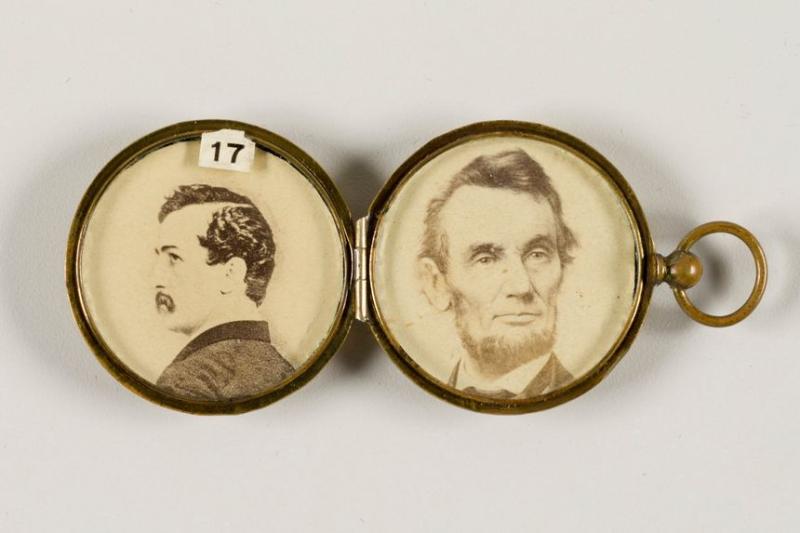'America's Original Sin' Review: The Meaning of His Violence
By: James L. Swanson (WSJ)



On April 9, 1865, Gen. Robert E. Lee surrendered his Army of Northern Virginia to Gen. Ulysses S. Grant at Appomattox. The Civil War—which had killed nearly 750,000 Americans—was almost over. During the night of April 11, a throng gathered outside the White House to serenade Abraham Lincoln and shouted for him to show himself. He appeared at a second-floor window. The torch-bearing crowd expected a triumphant speech matching its jubilant mood, but the president disappointed his audience. Reading from a prepared text, a dispassionate Lincoln, after honoring the men who had fought for the Union and won the war, spoke of the future: his plans to rebuild the nation, including the prospect of black voting rights. Standing in the crowd was the pro-Confederate, Lincoln-hating actor John Wilkes Booth, who declared to a friend nearby: "That means n— citizenship! Now, by God, I'll put him through! That is the last speech he will ever make."
Booth kept his word. Four days later Lincoln was dead. His murder still haunts America down to, in Lincoln's words, "the latest generation."
Why—and how—Booth killed Lincoln is no simple tale, as John Rhodehamel explains in “America’s Original Sin,” a fascinating and original contribution to the Lincoln bibliography. “Booth,” says Mr. Rhodehamel, “has often been dismissed as a crazy, drunken actor,” an interpretation that he rightly rejects. The assassin’s act was instead “a political murder that can be understood only in the context of the most violent period in American history.” The cornerstone of that violence, and Booth’s core motivation, was racism. “White supremacy,” Mr. Rhodehamel contends, “was the mainspring of Booth’s crime.” As the actor proclaimed: “This country was formed for the white not for the black man.”
Mr. Rhodehamel, a former archivist and co-editor of the definitive collection of Booth’s writings, offers unforgettable characters and deeply researched historical context, including: a group biography of the Booth family—patriarch and “mad tragedian” Junius Brutus Booth and sons Edwin and John Wilkes; an account of the “star” system in 19th-century theater; character studies of Frederick Douglass and John Brown (Booth had no use for Douglass, a former slave, but inexplicably praised Brown as “a man inspired, the grandest character of the century”); a description of the sectional crisis over the extension of slavery; and a chronicle of Booth’s evolving conspiracy to kidnap Lincoln and later murder him. This encyclopedic approach, though impressive, can result in a disjointed exposition that jumps around in time and between topics, inhibiting a smooth narrative flow.
Born and raised in Maryland, John Wilkes Booth absorbed the cultural prejudices of Southern slaveholding society. Later he owed his fame and greatest successes as an actor to Southern audiences. It was natural to embrace the Southern mind-set on race and slavery and, ultimately, secession and war. When Brown’s failed 1859 raid terrified Southerners with the prospect of a slave rebellion, Booth pulled strings to tag along with a Virginia militia unit to meet Brown in prison and then watch him hang.
Booth was not a fringe character. He represented mainstream thought, as Mr. Rhodehamel shows, and any account of his racial politics is the story of 19th-century American racism writ large. Millions of Americans, South and North, shared Booth’s supremacist views. The widespread reach of antebellum racism cannot be overstated, nor can the use of militant language and violent imagery (often depicting obscene sexual fantasies of rape and racial mixing) by Southern leaders and their Democratic allies in the North. One secessionist asked: “Submit to have our wives and daughters to choose between death and gratifying the hellish lust of the negro!! Better ten thousand deaths.”
Mr. Rhodehamel resists portraying Booth as a one-dimensional cardboard villain. Charming, generous and loyal, Booth was impossibly attractive and blessed with mesmerizing black eyes. A natural-born seducer, he proved irresistible to young actresses and teenage fans. As the actress Clara Morris confessed, it was “impossible to know him and not love him.”
Booth’s Lincoln obsession intensified during the 1864 re-election campaign with a bizarre scheme to kidnap him and hold him hostage. That plot was overtaken in the spring of 1865 by cascading events that drove the actor into a frenzied, alcohol-driven tailspin: Lincoln’s second inauguration; Lee’s surrender; and an illumination of Washington to celebrate the war’s end with fireworks and flame pots that made the dome of the Capitol glow like the moon. The actor saw it all. Late that night, he wrote his final letter to his mother: “Everything was bright and splendid. More so in my eyes if it had been a display in a nobler cause.” Mr. Rhodehamel reveals how Booth’s “passionate love for the South, his support for slavery and white supremacy, his hatred for Lincoln, and his despair as inexorable defeat overtook the [Southern] cause” propelled him to Ford’s Theatre.
During the nationwide manhunt for him, Booth devoured newspaper accounts of the murder and was astounded that the critics gave his performance bad reviews, condemning him as a loathsome assassin who caused so much anger and sorrow. He thought he had played the hero’s part. “Our country owed all our troubles to him,” he wrote before a Union cavalry patrol shot him to death, “and God simply made me the instrument of his punishment.” Booth’s murderous act made Lincoln the hero of the story—America’s secular saint. Mr. Rhodehamel advances the argument, first made by historian Michael Burlingame, that Lincoln should properly be viewed as a martyr to civil rights.
Americans still reckon with issues of race and equal rights that remain unresolved. Long before Booth became a stage star, he proclaimed his grandest ambition: “Fame, I must have fame!” In “America’s Original Sin,” John Wilkes Booth lives on as a racist and a murderer whose evil spirit still roams the land.
Mr. Swanson, a federal commissioner on the U.S. Semiquincentennial Commission, is the author of “Manhunt: The Twelve-Day Chase for Lincoln’s Killer.”



I guess this is what might be called a modern account of Lincoln's assassination. Rhodehamel says he knows exactly what motivated Booth and he may be simply stating the obvious.
The book is
America's Original Sin: White Supremacy, John Wilkes Booth, and the Lincoln Assassination
By John Rhodehamel
Johns Hopkins
480 pages